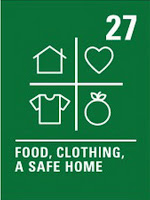By: Thomas Yulianto
According to the Ministry of PPPA (Woman Empowerment & Child Protection), the number of violence against children in Indonesia in 2021 is high, reaching 3.122 cases, and most of them are sexual violence. Its high number of violence against children became the stepping point for Stube HEMAT Yogyakarta to discuss with a theme "Mapping Children's Problems in Indonesia and Promoting Children's Rights." The discussion was held online (Thursday, 5/8/2021) and was attended by students from various regions, Nias, Medan, Bangka Belitung, Lampung, Java, Sumba, Manggarai, Alor, Maluku, and Raja Ampat.
Ariani
Narwastujati, S.Pd., S.S., M.Pd., the Executive Director of Stube-HEMAT was the
training resource person. She has experience in international training on
Children's Rights at Stube Nord, Hamburg, Germany. In the discussion, she asked
the participants about what they would fight for regarding the children's
rights? Most responses focused on the rights of education and protection. The
level of education rate in the village is lower than in the city, due to low
understanding of children's rights among parents, such as getting a 9-years-minumum education. In some participants’
areas, the violence against children occurred because of the habits of the
parents as the example from one generation to other generation, so that the
rights to protect children need to be fought for.
Ariani presented the International Convention on the Rights of the Child, which began in 1989 when the world's governments gathered and made a policy to protect children by the international legal framework of the United Nations. Children need care while growing, learning, playing, developing, and to be treated fairly. There are 42 points in the children’s right in the convention and they are ratified into 10 point of children's rights in Indonesia. They include the rights to a name or identity, protection, have citizenship, food, health, recreation, education, play, participation in development, and equality. The rights to child protection in Indonesia itself are regulated in the Law of the Republic of Indonesia, No. 23 of 2002.
After receiving material on the International Convention on the Rights of Child and children's rights in Indonesia, the participants are well informed with children's rights. It could be heard from the feedbacks of the participants' experiences that occurred in various regions in Indonesia showing children who suffered from physical violence when they were assumed to be disobedient, ignorance by busy working parents, unhealthy home environment because of the smoking parents, and traditional needs are prioritized over providing children's educational needs. From the findings of these cases, the participants learned that children's rights had not been fully fulfilled and discovered that not everyone understood children's rights. The understanding and awareness of children's rights were important for adult in the child's environment to provide space for children's growth and development and learning. These various incidents may be caused by the low knowledge and awareness of children's rights besides the influence of life habits, education level, and culture. It is expected in the future that through intense education and socialization to the community about children's rights, there will be better understanding and realization of children’s rights.
Through
the discussion, the participants were challenged to involve themselves as
agents of change, to fight for children who have not yet get their rights in
their childhood. They are motivated to implement children's rights when they
become parents somedays. Long live Indonesian children! ***










Comments
Post a Comment